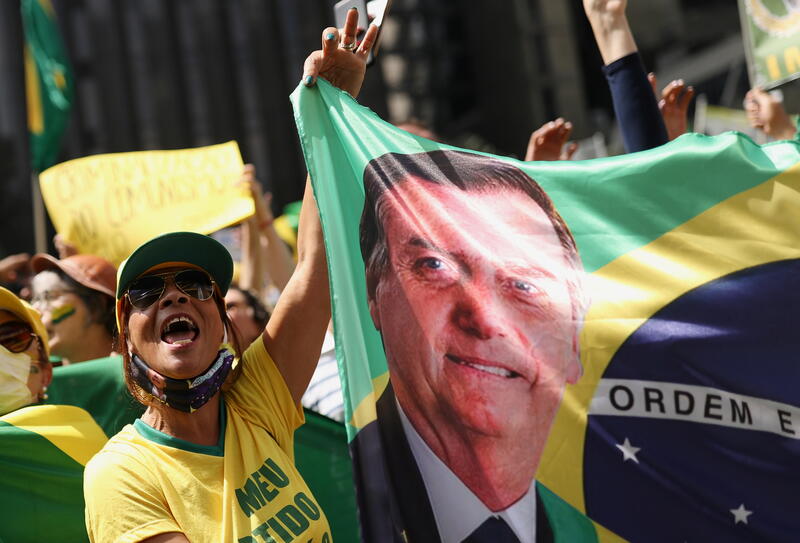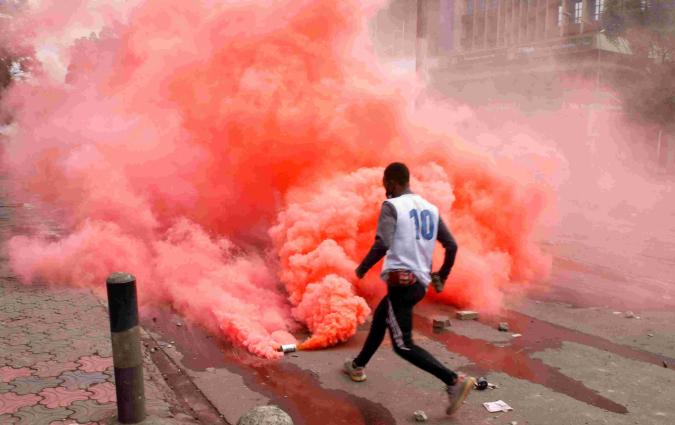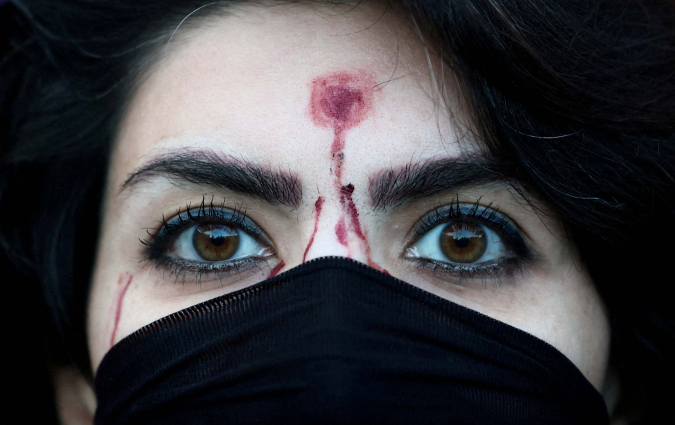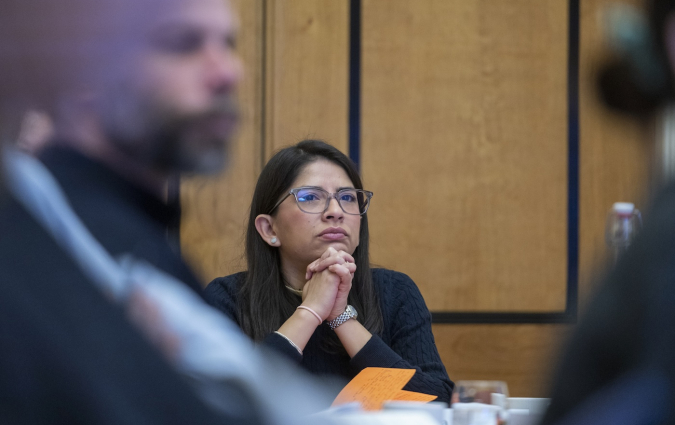The fight for facts in the Global South: how four projects are building a new model

A supporter of President Jair Bolsonaro holds a banner with his image, Sao Paulo, Brazil, September 7, 2021. REUTERS/Amanda Perobelli
Audiences in the Global South are more worried about misinformation than those in the Global North. According to the Digital News Report 2021, percentages of people concerned are higher in Africa (74%) and Latin America (65%) than in North America (63%) and Europe (54%). Increasingly polarised politics, a growth in messaging apps and the COVID-19 pandemic may have exacerbated these concerns.
Recent years have witnessed a boom in independent fact-checking and verification initiatives across the Global South. The Africa Facts Network, founded by the continent’s first independent fact-checking organisation, AfricaCheck, now has 20 members. In Latin America there’s a similar 33-strong coalition of organisations in 18 countries working on coronavirus misinformation.
Fact-checkers in the Global South share challenges and methodologies with their colleagues in the Global North. But they must contend with specific political, cultural and media environments and must deal with distinct issues.
In regions such as Sub-Saharan Africa, where internet access is uneven across the population or where mobile data is prohibitively expensive, fact-checkers must find new ways to reach offline audiences, as well as enduring the threat of internet shutdowns and restrictions to their digital output. In countries with younger democracies, fact-checking is a vital means of holding power to account.
This piece features fact-checkers from Argentina, Brazil, India and South Africa who share a mission of countering misinformation, equipping audiences to spot falsehoods and exposing lies that pose threats to health and civic engagement. From WhatsApp voice notes to community helplines, they’ve pioneered new formats and distribution channels overlooked in the Global North. Here’s what they’ve learnt along the process.
What Global South fact-checkers face
Chequeado is South America’s first independent fact-checking organisation. It was founded in Argentina in 2010. Its executive director Laura Zommer believes its scope has been bigger than the one of fact-checking sites in the Global North from day one: not only have they fact-checked public leaders but also those in business, society and the media.
“It’s not the same doing this work in countries where democracy is restrained or not working. We have the same problems as fact-checkers in the Global North, plus a lot more,” says Zommer, who mentions unreliable or incredible data or a lack of freedom of information laws.
Brazilian journalist Tai Nalon, executive director and co-founder of fact-checking site Aos Fatos, says the challenges for fact-checking have also grown since its founding in 2015 with a rise in organised misinformation and disinformation campaigns. “The amount of politicians who have weaponised lies has reached an industrial level since the 2018 elections,” she says.
Polarisation in Brazilian society means every topic, including vaccines, has become politicised. “You’re not only using science to debunk something,” Nalon says. “You have to explain why this is not a conspiracy against society.”
Argentina’s Chequeado wants to make “public debate more rational” through its investigations and explainers, debunking claims and misinformation flagged by the audience and educating people in verifying viral information. The newsroom believes collaboration, transparent methods and diverse financing can help counter the political polarisation surrounding many news topics in their home country.
Operating in deeply polarised societies is taking its toll on fact-checkers. While the number of lawsuits faced and the reaction from partisan publishers are viewed as perverse measures of impact, Nalon recalls team members leaving Aos Fatos. “They didn't want to publish fact-checks or investigations regarding disinformation campaigns anymore, because they felt exposed,” she says.
In addition to online trolling and abuse from bots and individual users, Nalon raises concerns about physical threats to her team from people emboldened by conspiracies and misinformation. In May, Aos Fatos was ordered by a judge to remove references to a Brazilian magazine and its fact-check ratings of the outlet’s posts on Facebook. The magazine argued the fact-checks had hurt it financially and were a “modern form of censorship”. Fighting these accusations is costly and time-consuming.
Fact-checking organisations can become targets of hatred when holding politicians and hyper-partisan audiences to account. “The fear here is that if I get something wrong, anything could happen to me,” says Govindraj Ethiraj, founder of BOOM, the first Indian member of the International Fact Checking Network (IFCN) and the first organization in India to be part of Facebook’s third-party fact-checking programme.
Measuring impact
These challenges shape how these fact-checking news organisations sustain themselves and measure the success of their work. Expanding the reach of their work is a shared goal. It’s necessary to both counter the size of the misinformation problem and to reach audiences whose lives, health or freedoms could be directly damaged by false claims.
“We don’t want to talk to the people already worried about data or public policy; we want to reach people who don’t follow the news,” says Chequeado’s Zommer. “To increase the cost of lying, we need millions of people to worry about it, not just academics, journalists or politicians.”
That’s why Chequeado is building new products and methods of distribution that can help its journalists connect with more remote audiences. In recent experiments they’ve partnered with TV channels and created content for TikTok and WhatsApp. In any of these experiments, they use an agile approach: if something doesn’t work, they drop it.
Other measures of success include quoting of fact-checks in parliament, thank you notes from readers and mentions by influencers. Chequeado keeps a record of these impacts to help it set goals and monitor progress. The database currently notes interviews, public talks, workshops and other activities that illustrate Chequeado’s reach, as well as direct impacts of its work, such as updates to publications from authorities because of its work or judicial actions taken.
For such lean organisations, a flexible approach is important. While some grants include money for experimentation, sustaining multiple products and not assessing their performance could waste valuable resources.
Working with platforms
Working with social media platforms as part of fact-checking initiatives can provide a clearer idea of impact, says Noko Makgato, executive director of AfricaCheck, an independent fact-checking organisation launched in 2012. AfricaCheck participates in Facebook’s third-party fact-check programme along with more than 80 other paid partners including Chequeado, Aos Fatos and BOOM. Facebook provides some data on how many fact-checked posts were rated or removed and how many people viewed an organisation’s fact-check, which gives a sense of progress.
“With any of the other work we do, getting a sense of its impact is very difficult; with this programme, the impact you feel is recognisable super early and super clearly – especially when somebody's not happy about it,” says Makgato. The data shared so far is “encouraging”: “Going forward, we hope we can have it made available to us regularly and with more details.”
Facebook suppressing posts found to be false is the “biggest multiplier of our work”, says BOOM’s Ethiraj. Expanding the subject areas covered in the fact-checks BOOM publishes has increased its reach and visibility with news audiences too. The site also runs a WhatsApp helpline where people can send information for checks. The response is sent back via WhatsApp in the hope the sender will share it further: “It’s a smaller kind of impact, but it’s a definite footprint. These are people who are very closely engaged with us, seeking our help.”
BOOM operates in three languages (Hindi, English and Bengali) and has local websites for Myanmar and Bangladesh. Now it wants to expand to at least six or seven of India’s major languages. “A fair amount of original misinformation is in a language we’re not tracking,” says Ethiraj. “This takes resources we don’t have, so we're achieving amplification where we can.”
A digital army, ready to fight for truth
AfricaCheck wants to use a range of platforms to ensure the widest reach and address “uneven digital access in Africa” as well as the continent’s linguistic diversity. The organisation is trying to change people’s behaviour when sharing and receiving information by “getting to both the supply and the demand sides of misinformation”. Actions on the “supply” side may include engaging directly with the sources of misinformation during a fact-check to seek evidence for the claims that they’ve made and, when there’s no evidence, asking for a public correction. An outreach programme aimed at civil society, public servants and politicians, with increased activity during election periods, also aims to address the issue at source with discussions about the perils of misinformation and the role of these actors.
Empowering younger audiences is critical to this as they spend a lot of time online and as there is a chance to develop their critical thinking skills. “If we give the youth basic [identification and verification] tools, they’ll share with peers and parents. It’s a multiplier effect,” Makgato says.
AfricaCheck has organised media literacy programmes, including the #KeepTheFactsGoing programme in response to COVID-19, and is working to make these sessions and resources available through its regional offices and partners in local languages, including Isizulu in South Africa, Swahili in Kenya, Hausa in Nigeria and Wolof in Senegal. This expansion has been coupled with experiments in format and distribution: audio-video content from the COVID-19 programme was formatted and shared on social channels, via WhatsApp voice notes and through community radio stations, for example, while a current campaign on COVID-19 vaccine misinformation combines in-person school workshops and online tutorials in addition to multi-platform audio and visual content.
“Our media literacy efforts help to proactively inoculate people against misinformation. We’ve had an enthusiastic response from communities and our supporters,” says Makgato.
To further reach communities who don’t have internet access, AfricaCheck has new plans to use radio dramas. “In some villages, families gather round the radio and listen to a serialised drama every night. We're tapping into that format to empower people with the skills to identify and deal with misinformation,” says Makgato. Listeners will be able to call in and participate in the first time AfricaCheck has gone “off the grid” with its work: “A lot of fact-checking efforts globally focus on online approaches. We don't have the luxury of that assumption in Africa,” Makgato says.
Speed matters; AI helps
Changing people’s behaviour is a long-term process and an additionally tricky impact to quantify. Speed from fact-checkers can be crucial. “Our impact is much bigger if our reaction happens in the moment when the [false] content is increasing its reach,” says Chequeado’s Zommer.
To increase speed, Chequeado has invested in technology and collaborations. It launched Chequeabot in 2018, an artificial intelligence (AI) tool that scans newspapers, presidential speeches and parliamentary proceedings for facts. Half of the facts checked by the newsroom come from this bot.
Aos Fatos also uses an AI-powered bot known as Fátima on Twitter, Facebook and WhatsApp. The bot allows audiences to search a database of fact-checks and sources, increasing the volume of requests the team can handle while taking its fact-checks to audiences on the social networks where they get their news.
“With the 2018 election, we had to do something regarding large-scale disinformation campaigns involving social media,” says Nalon. “Human hands and brains were not enough. So we built an algorithm that predicts and monitors patterns of language that may be linked to misinformation.”
Radar highlights how information crosses between platforms and when misinformation breaks from private groups and starts to gain traction in more public networks. Between Radar and Fátima, the team can see when politicians are talking about the same subject and fact-check multiple statements at the same time, hastening the work and increasing its impact.
Anything that allows fact-checkers to consistently offer a timely response to questionable claims is critical in an environment where social media and other digital tools are ready to fill an information vacuum on any given subject at great speed. BOOM aims to be more proactive to help tackle this issue, producing explainers on topics that anticipate audience questions where misinformation could creep in. Ethiraj suggests that filling this gap could contribute to rebuilding audience trust in news.
Impact through collaboration
Beyond these teams and tools, collaboration is crucial to deepening and broadening the impact that these fact-checkers can have. Makgato says AfricaCheck soon realised it needed “a coalition of forces” to have an impact across the continent. It gives training to journalists and newsrooms to build fact-checking and verification skills, but also “incubates” emerging fact-checking organisations through the Africa Facts Network, supporting them with operational and financial advice.
“To react quickly we need to work together. We are stronger and we create trust in a shared methodology for fact-checking,” says Zommer. Chequeado allows other newsrooms to reuse its content. It is also working with indigenous people to offer more translated versions and making its technology open source so other fact-checkers have access to the most efficient tools.
Chequeado, Aos Fatos, BOOM India and AfricaCheck have all previously signed up to the International Fact Checking Network’s (IFCN) code of principles (some signatures are awaiting renewal), a globally agreed set of standards for non-partisan fact-checking outlets. By committing to the code, these organisations commit to non-partisanship and fairness, as well as transparency in relation to their methodology, funding and operations.
Money matters
Sustaining this work is both a financial and an ideological challenge. Fact-checking organisations are smaller than legacy media outlets but they often struggle to secure funding. Legacy revenue streams, however faltering, aren’t available. Aos Fatos, Chequeado and AfricaCheck do not run advertising, for example.
Chequeado’s budget for 2020 was more than 76.7 million Argentine pesos (around $778,000). Though not possible in 2020 owing to the COVID-19 pandemic, it has previously run fundraising events with between 50 and 70 companies participating in a given year, ranging from Uber and Coca Cola to Santander Río and Tetrapack. Money also comes from crowdfunding campaigns, international cooperation and philanthropic donations, to ensure a diversity of financial support. No money is received from any level of Argentina's government. For Zommer, this diverse model is different to the one of other newsrooms in the region and ensures economic autonomy and editorial independence not enjoyed by many outlets in the Global South.
Finding money is an “omnipresent challenge” for AfricaCheck, not least because a donor model can be unreliable long-term. “It’s important to put sustainability at the centre of our strategy because this work will all die instantly if we were dependent on a few donors,” Makgato says.
Potential funders may bring their mission and agenda, says Makgato. If this undermines AfricaCheck’s mission or values, the offer is rejected. Anonymous funders are out too – they don’t align with the team’s commitment to transparency. The newsroom doesn’t accept government funding except for educational work so no influence can be perceived on its editorial position.
AfricaCheck has worked to generate its own income to support a 2020 operating budget of more than R27.1 million (around $1.8 million). A separate “income-generating entity”, TRi Facts, was established in 2015 with the singular purpose of raising funds for the future of AfricaCheck’s work through consulting, research and training work that takes the skills learned as fact-checkers – how to work with data, how to communicate facts – and applies them to the corporate world for a fee.
A poisoned chalice?
The fact-checking movement relies heavily on big tech money and its leaders recognise the tension this creates: the platforms are trying to address the misinformation problem but have played a major role in its growth. If their attention shifts elsewhere, this funding may disappear too.
“Their inability to handle this property has grown to be a problem,” says Aos Fatos’ Nalon. The Facebook programme allows the outlet to reach a significant audience with its fact-checks, but its work there is shaped by how the platform wants to tackle misinformation. Facebook doesn’t allow the team to flag politicians’ posts as misinformation, suggesting it affects politicians’ rights to free speech. Politicians are the “main spreaders” of misinformation in Brazil, says Nalon, confirming the perception of the people surveyed for the Reuters Institute’s Digital News Report. Leaving their posts unchecked or labelled ultimately restricts the impact fact-checkers can have.
A crucial challenge that Facebook needs to tackle is educating its users about the programme, says Makgato. It’s likely that many Facebook users don’t know it exists and that their posts may be reviewed by an independent fact-checker should it contain unverified claims.
“Educating users about this programme would not only help increase vigilance and encourage users to proactively report misinformation they encounter on the platform at significant scale. It would also help users who are exposed to the false content to know that they can learn the facts by reading the fact-check reports attached to label false content,” he says.
Working with Facebook is conflicting, says Nalon: without this funding Aos Fatos wouldn’t be able to continue its current work. The political situation in Brazil may have to worsen further before other sources of international or foundation funding become available for this work. Even with appropriate funding, tackling the scale of the misinformation problem depends on the right technical abilities and skills. “The smartest engineers will work for Facebook or Uber, not small journalism outfits, “ says BOOM’s Ethiraj. “We can only do what we can do.”
Fact-checkers in the Global South are pushing for answers to the information problems of our age. Their work suggests an underlying question: is journalism equipped to deal with this problem? Traditional formats struggle to deal with uncertainty, crucial when facts are still changing or a void in information opens that bad actors or questioning audiences are ready to fill.
These teams are pioneering ways to address this problem and build new media models to serve the public. Assessing the impact of their experimental interventions to change people’s behaviours and cultivate young audiences will provide vital insights into the responses required to engage audiences in specific regional and cultural contexts. These learnings may be useful for their colleagues in the Global North.
Laura Oliver is a freelance journalist based in the UK. She has written for the 'Guardian', BBC, 'The Week' and more. She is a visiting lecturer in online journalism at City, University of London, and works as an audience strategy consultant for newsrooms. You can find her work here.






